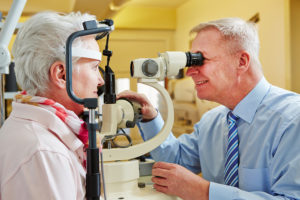What Are Some of the More Common Eye Diseases Affecting the Elderly?
Do your parents go for yearly eye exams? It’s important that they do see an ophthalmologist once a year for a thorough exam. During this exam, screenings for common eye diseases take place. Caught early, many of these eye diseases can be diagnosed and treated or monitored each year.

Home Care in Mission Viejo CA: Common Eye Diseases in the Elderly
Age-Related Macular Degeneration.
Macular degeneration affects the macula, which is an area in the center of the retina. Symptoms of macular degeneration include blurred vision, dimmer vision, and loss of vision in the middle of the field of sight. It’s a disease that progresses slowly and has no cure.
Astigmatism.
Astigmatism often starts in infancy. The cornea or eye lens is slightly curved. This can lead to blurry vision, headaches, and eyestrain. It often goes hand in hand with myopia. Surgery, glasses, or contact lenses can correct the issue.
Cataracts.
Cataracts occur later in life. According to the American Federation for the Blind, half of all seniors age 80 or older have cataracts. In the early stages, anti-glare sunglasses can help. Seniors with cataracts may be told not to drive before the sun rises or after sunset. If the cloudy vision is affecting daily activities, surgery can treat cataracts.
Diabetic Retinopathy.
If your parent has diabetes, it’s important to monitor eye health. Diabetic retinopathy is a condition where diabetes puts a strain on blood vessels in the retina. Untreated, your parent could lose his or her eyesight.
Glaucoma.
When fluid within the eye increases and puts pressure on the eye, loss of vision occurs. It’s the peripheral vision that goes, which makes driving dangerous. Seniors with glaucoma should see a doctor to prevent vision loss. Eye drops and surgery are common treatments for glaucoma.
Myopia.
Myopia is one of the more common eye conditions. You know it best as nearsightedness. People with myopia see things close up, but those things farther away are blurry. Glasses, contact lenses, or eye surgery corrects myopia.
Presbyopia.
After the age of 40, most people experience presbyopia. It’s a condition where small print becomes hard to see. You usually have to hold books, magazines, and labels a certain distance from the face in order to read it. You may find yourself needing a magnifying glass or reading glasses.
When changes to the vision make it hard to drive, you must talk to your parents into giving up the keys. They don’t have to give up their independence or freedom. Home care professionals can drive them to appointments, stores, friends’ houses, senior centers, and other area locations.
If you or an aging loved-one are considering home care in Mission Viejo, CA, please contact the caring staff at Easy Living Home Care today. Providing Non-Medical Home Care Services in Orange County, CA since 2009. Call for Assistance: (949) 282-5017 or (949) 842-6831
Sources:
http://www.afb.org/info/living-with-vision-loss/eye-conditions/12
- Can You Help a Senior Who Has PTSD? - August 27, 2019
- What Do You Do if Your Senior Falls? - August 13, 2019
- Is Gum Disease Really That Dangerous? - July 16, 2019
